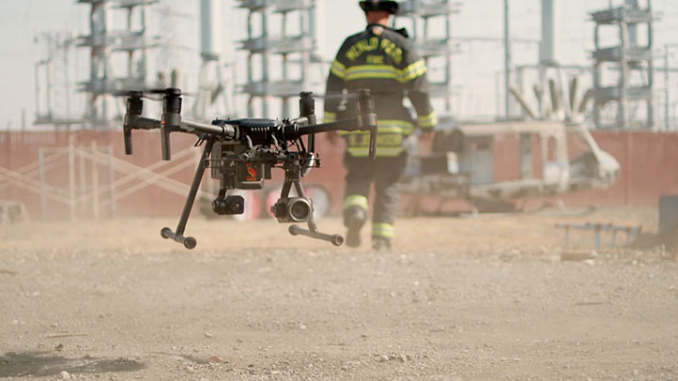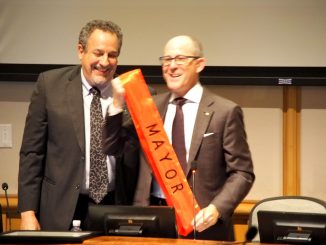
BY ELAINE GOODMAN
Daily Post Correspondent
The Mountain View City Council tonight (April 9) will discuss a possible policy for the city’s use of drones, even as the police, fire and public works departments have expressed interest in buying the devices.
A report to the council from Police Chief Max Bosel, Fire Chief Juan Diaz, and Public Works Director Mike Fuller outline the departments’ many potential uses of drones, which are also called unmanned aircraft systems, or UAS.
Public works could use the drones for such tasks as inspecting roofs and gutters or overseeing road projects, according to the report. The fire department could use drones during a fire to find hot spots and determine when the fire is fully extinguished. Drones could also contribute to life-saving efforts after a natural disaster or help manage the response to mass-casualty incidents.
Police could use drones to search for missing people or to check out suspected bombs or other dangerous scenes. Drones could be used in documenting a collision or crime scene.
Drones could also help police search for a suspect, which is now typically done by officers and police dogs, according to the report.
“A UAS equipped with thermal imaging and a high-resolution camera would greatly improve the chances of locating the suspect, lessen the chance of officers and suspects being injured, and could limit the need for officers to enter private property as part of the search,” the report said.
Privacy concerns
Government use of drones has raised privacy concerns among groups such as the American Civil Liberties Union.
In 2014, the city of San Jose was blasted by the ACLU of California for its seeming attempts to hide the police department’s purchase of a drone.
The City Council’s approval of the purchase was included as an item on the consent calendar, in which several items are voted on at the same time without discussion, and the summary contained no reference to a drone, the ACLU said.
“When communities are considering drones or other technology that can easily be used to invade privacy, the public expects to know what’s happening and have meaningful opportunities to weigh in early in the process,” the ACLU of California said.
In an August 2014 press release, the police department admitted it should have done better in communicating with the public about the drone. SJPD promised to develop a community outreach plan before deploying the drone.
The ACLU continues to closely monitor the drone issue. The organization acknowledges on its website the usefulness of drones in some situations, “including in search-and-rescue missions, scientific research, mapping, and more.”
But concerns remain.
“Deployed without proper regulation, drones equipped with facial recognition software, infrared technology, and microphones capable of monitoring personal conversations would cause unprecedented invasions of our privacy rights,” the ACLU said.
Tested at a music festival
Still, the public might be feeling more comfortable with drones. Mountain View police tried out drones in July during the Audiotistic music festival at Shoreline Amphitheatre — a test that seemed to raise few eyebrows.
Police brought in technology company Aptonomy to provide drones and fly them during one day of the festival.
Police promised at the time that the drones would not be flown over the crowd, homes or nearby businesses. Instead, the idea was to fly the drones over areas where there might be traffic jams, so officers could step in to alleviate problems. The drones were to circle the outside of the venue and the parking lots to look for criminal activity such as fights or car break-ins.
The Menlo Park Fire Protection District has actively publicized its use of drones. In a November press release, the district describes how its drone team was using drones to map damage in Paradise and Magalia following the Camp Fire.
In March 2018, the fire district used drones to inspect the inside of a vacated apartment where officials suspected there might be a meth lab. The noxious smell that triggered concerns about a meth lab was later attributed to a mixture of cleaning supplies.
“Once again, our drone team showed the unbelievable benefits of this incredible technology with some very skilled handling of the drone,” Fire Chief Harold Schapelhouman said in a news release.
In Mountain View, the police and fire chief have recommended incorporating the ACLU’s “safeguards” for government drone use into the city’s policy. Those include limiting drone use to specified situations and restricting when images can be stored.
Drones wouldn’t have guns
Placing weapons on the drone would be prohibited under the proposal, as would be conducting random or proactive surveillance. The report also suggests that the city keep a log of its drone use that would be available to the public on the city’s website.



